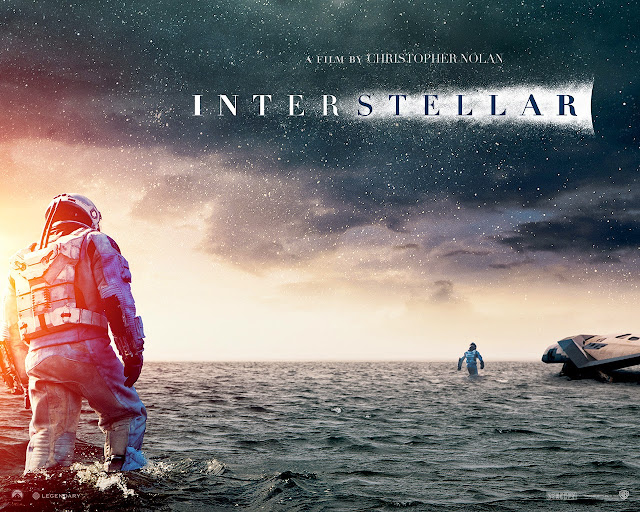The world is dying. Humanity, in its splendor and ignorance,
has finally driven the planet past the breaking point.
During the 1930s in America the people of the southwest
experienced a Dust Bowl; a multi-year drought which created massive dust storms
that killed the agricultural abilities of that region.
When we meet the main characters of Interstellar:
Cooper, Murph, Tom & Donald, it is a dark time for crop production. Virtually all cash crops have been made
extinct by the blight and now all that humanity has left is corn. Cooper (Mathew McConaughey) is an
engineer/pilot/genius turned farmer and he and his family have made the tough
decision to stick it out and keep producing corn in an attempt to continue
feeding the world.
The first part of the movie sets the tone for why humanity
needs to act as desperately as they appear to do later in the film. The director, Christopher Nolan (The Dark
Knight, Inception) does an excellent job of maintaining the human element
throughout the movie. Far too often the
audience has the need for an emotional connection to the characters thrust at
us at some point in the film and then the idea is abandoned and it is simply
expected that it will continue to exist.
Like a sapling dropped in the ground, loosely covered in soil and given
no water or nourishment; it will not grow.
 |
| Courtesy of Warner Bros. |
Let’s talk about the story.
NASA has detected a wormhole in the space around Saturn. Prior to this story’s beginning they sent
twelve individual manned missions through the portal to land on and explore the
planets that had been discovered. If the
world was found to be habitable and of good quality the explorers were to
report back and NASA would begin the process of sending the rest of our race to
follow after them. Cooper and his
daughter Murph come upon the installation NASA is running this operation from
in secret.
Despite the long runtime, 169 minutes, there is not much
dilly-dallying. From the point where
Cooper finds NASA to when he is on a spaceship heading into the unknown is
roughly eight minutes of screen time. It
was as if Nolan was saying to the director of Armageddon, “I could have
done your movie…better…an in about a quarter of the time”.
Let’s talk physics.
Christopher and his brother Jonathan Nolan, whom have partnered on
several script writing undertakings in the past: The Dark Knight, The Dark
Knight Rises, Memento, and it is clear that these brothers know their
physics. Far too often in science
fiction films that are supposed to be based in reality the impossible is set as
merely a tiny hurdle to be jumped (I’m looking at you Gravity!). But Interstellar uses actual science
to discuss potential risks and dangers involved in the mission. For example: when visiting the first planet
after coming through the wormhole the team must decide how to approach the
planet, which is incredibly close to a black hole, because the closer they pass
by the anomaly the more slowly time will move for them. Because the planet is so close to a black
hole time operates differently; an hour on the planet is seven years of real
time. This is both totally fucked up and
cool at the same time.
 |
| Courtesy of Warner Bros. |
Often times with
science fiction movies that involve present day humans there is a tendency to
use the “everything that could possibly go wrong will go wrong” mentality; a
good example of this would be Mission to Mars. Interstellar doesn’t do this. Sure things go wrong and sure there are
problems to add drama to the film but they are more believable because they are
not so damned predictable.
There are portions of the movie that you just have to take
on faith. Faith that Nolan will explain
himself and his vision at some point.
Like how when a dust storm kicks up and Murph forgets to close her
window so her room is covered with dust.
The dust coalesces into lines which spell out coordinates in
binary…which Cooper realizes and identifies.
This isn’t TOTALLY insane since Cooper has already been portrayed to be
exceedingly smart and inquisitive, but it’s a bit of a stretch for the
audience.
At times movies can be either ruined or significantly
enhanced by their score; movies like Gladiator and Star Wars are
examples of the latter. Interstellar
has a score that completely draws you into the story. The moments of tenderness are soft and
inviting and the moments of pure adrenaline driving intensity are represented
by roaring crescendos that will drop your jaw without you even realizing it.
Nolan has proven himself to be an outstanding creator and he
did not let us down with Interstellar.
You don’t have to be a fan of sci-fi to enjoy this movie; because in
truth it’s not a science fiction movie.
What occurs is rooted in fact or theory…with a little bit of imagination
added to it.
If you missed this in the theater I feel for you, but make sure you catch this as soon as possible!
As always, thanks for reading!


No comments:
Post a Comment